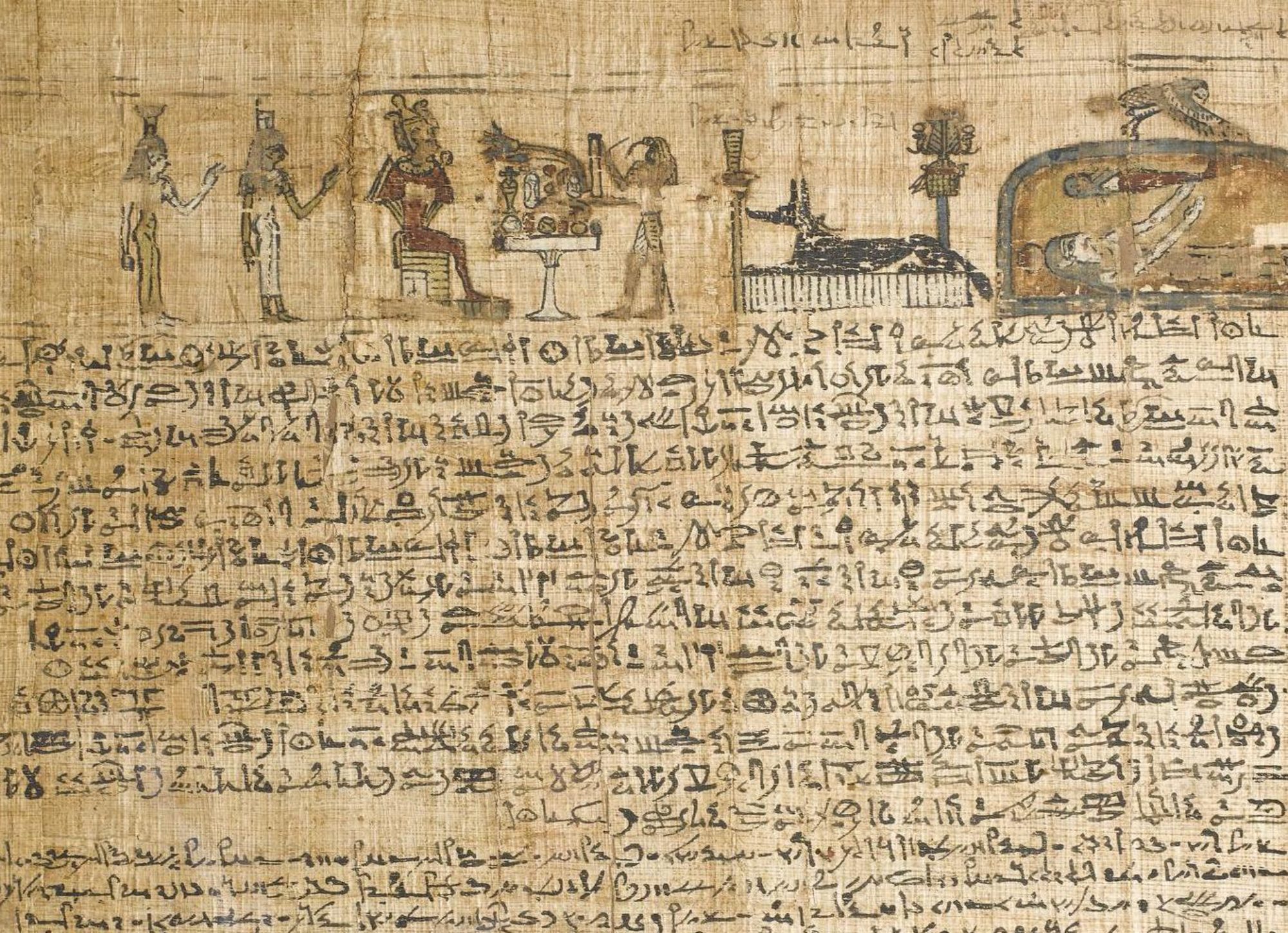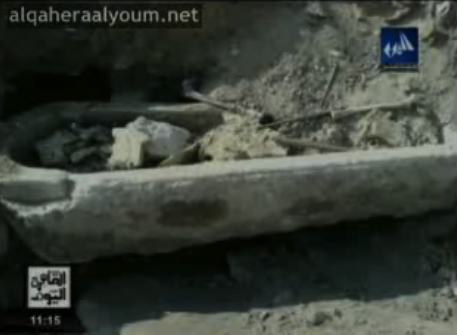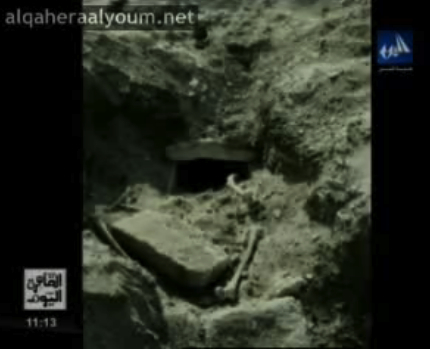Update March 10th: Excavator of the site Carol Redmount is posting to a newly founded Facebook group ‘Save El Hibeh Egypt’. For those without Facebook access, Glenn Mayer has posted her appeal in the comments on this page.
This Egyptian news video (click here to view) reports on looting in El Hibeh. Photographs of ransacked tombs and scattered human remains are shown from the 7.20 mark. These heartbreaking images bear witness to a heartless attack on Egyptian history and human dignity. An article about the looting has also been posted to alwafd.org and Glenn Meyer has provided a translation of the Arabic:
While political parties are wrestling to reformulate the constitution and members of parliament are competing to gain as much media attention as they can. While politicians are busy attacking / defending the Military Council and economists are concerned about the bad financial situation of the country. While the Ministry of Interior is busy with the battle over whether to allow beards or not, while other activists are jostling to impose their opinions in the media throughout Egypt and while the elite are busy with these cases, there is a mafia is devoted to looting antiquities what the ancient Egyptian civilization left us. They are no longer practicing their crimes in darkness, but in the middle of the day with bulldozers while the Ministry of Antiquities and the police are in silent!!
Because the Bulldozer has no heart and the mafia has no conscience, they have destroyed priceless antiquities, demolished temples that were beacons for the world, desecrated tombs and looted mummies leaving them in open air.
Horrible information has emerged about crimes that these antiquities mafia are committing in many areas in Egypt such as in Abu Sir, Abu Rawash, Sakkara and Beni Suef etc. Tonnes of Egypt’s antiquities have been stolen in the last couple of months, much of it transferred by trucks to hiding places controlled by this mafia.
The Egyptian soil still contains much that excavations continue to find, these excavations are conducted by specialized people under the protection of the state with the support of officials. Police have withdrawn from all the antiquities sites leaving them to thieves who do what they like.
It is unbelievable what is happening now to our history, you can just go to el Heba, Feshn office, Beni Suef and you would see an example of this wonder.
El Heba contains an exceptional collection of antiquities extending from the Pharaonic dynasties to the Coptic and Islamic Periods. Antiquities that provide information about three consecutive periods of Egypt’s history.
Because of is very dry environment, the pharaohs chose el-Hiba to establish a Pharaonic archives center where they kept copies of papyrus documents, laws and stories. King Sishonk constructed a large temple similar to the temple of Karnak and sealed his name on every single stone.
Ancient factories were built around the temple and workers built their houses around these factories. They built two huge cemeteries at the east and west sides of the city and surrounded it with fence to protect it.
When the Coptic era started in Egypt, the place became a unique area containing many Coptic antiquities and the same happened during the Islamic Period.
In short, El Hiba is an example of a rare location that contains antiquities from three different eras, Pharaonic, Coptic and Islamic. When this city was discovered in 1896 by the Egyptian Egyptologist, Mr. Ahmed Kamal, this was a great discovery.
Foreign missions started to come to this area with the hope of uncovering the antiquities while local police provided a specialist protection to this site.
As soon as the Egyptian revolution started and the police withdrew, the police left the area to the looters to find these priceless treasures. The leader of the El Hiba mafia is a man called Abou Atia, who escaped an execution order. He has got hold of a bulldozer and hired tens of men equipped with guns and dynamite and are currently digging el Hiba looking for antiquities and gold within the tombs.
However, Abou Atia’s gang took different kind of antiquities from el Hiba, some of these have been moved to private magazines in order to be sold. Tens of tombs were robbed, some mummies and sarcophagi were kept in places and others were left in the open air, small statues and some golden pieces were also stolen from the tombs.
Abu Atia’s gang has been looking for antiquities for a year now, they have dug 400 holes in the 2km city, the depth of some of these holes is more than 15 meters.
Because of this mafia, the beautiful and the important city of Hiba has turned into a battle field that our predecessors’ skulls and bones scattered all over the ground. The whole area is covered by holes that these looters have made, the temple, most of the houses and tombs dated to 1700 B.C. are now demolished.
So the Ministry of State for Antiquities has found no one to protect them and it looks as though the Ministry believes that their only possibility is to protect the Egyptian Museum.
Sadly, foreign missions are more concern about Egyptian history / antiquities than the Egyptians themselves. Are we waiting to ask the international community to interfere to save out heritage after we failed in protect it?
I met with Dr. Carol Redmount, specialist in Egyptian antiquities and a Professor at Berkeley, California and I asked her about what she observed after the latest security chaos. Sadly she said that the condition of the Egyptian antiquities is painful after the Egyptian authorities left it with no protection against the looters. She said, I live in Egypt many months every year and I visited all the antiquities sites in Delta and I have a passion for them that I feel they become part of me.
Q. Did you visit El-Hiba in Beni Suef?
A. I did, and I spent many years there excavating from 2001 -2007 under Egyptian supervision and I returned back in 2009.
Q. How did you see this area?
A. It is a complete antique city, very beautiful and the only one that
tells how the regular Egyptians used to live in the Pharaonic time because most of the habitants were regular people, farmers or workers.Q. Did you know what happened to this area in the past months?
A. Unfortunately I knew, some people called me and told me about these crimes happened in Al Heba, then I called the people at the inspectorate office and informed them.
Q. What did they say?
A. We are so upset
Q. Just upset?
A. No, they said they tried to protect the city and they informed the police and asked for help
Q. What was the police answer?
A. Nothing
There is only one meaning to what the antiquities expert said, this is that the Egyptian authorities protect the Egyptian mafia.
I express one phrase to these people who are protecting this mafia, that Dr. Andy Daily, an American Professor of History said to me I love Egyptian history and every Egyptian must feel shame of what’s happening to the Egyptian antiquities from this mafia. We really need to feel shame.
An article in the French newspaper Le Monde also discusses looting and illegal construction occurring in a number of other sites throughout Egypt, particularly Aswan (a rough English translation is available here).
Update March 12th: Here is the press release issued by the El Hibeh expedition and also a link to the latest Egyptian television coverage.
Press release on the looting of El Hibeh
–The El Hibeh ExpeditionMassive looting of archaeological sites in Egypt continues as security forces turn a blind eye to thugs plundering Egypt’s cultural heritage.
After Egypt’s revolution, priceless artifacts were stolen from the nation’s world-famous Egyptian Museum in Cairo as well as from innumerable storehouses scattered throughout the country.
Today the continued plundering of archaeological sites, which comprise Egypt’s cultural heritage in its most pristine state, presents an even more critical challenge as sites are often remote and protected by low-paid guards and state security seems unable or unwilling to halt the mayhem.
El Hibeh is one such site. On the east bank of the Nile in a particularly impoverished area of Egypt three hour’s drive south of Cairo, the archaeological site occupies about two square kilometers and includes cemeteries and the ruins of a walled ancient provincial town with a limestone temple, industrial facilities, houses and possible fort and governing residence. The remains date from the late Pharaonic, Graeco-Roman, Coptic and early Islamic periods (approximately 11th century BCE to eighth century CE). Hibeh is of special importance because it is one of very few relatively intact town sites remaining in Egypt and because of its extensive archaeological deposits dating to the Third Intermediate Period, Egypt’s last “Dark Age” and an era particularly poorly known archaeologically.
Eminent University of California, Berkeley archaeologist Dr. Carol Redmount arrived in Egypt in February to continue her archaeological work at the site after obtaining the proper permits from Egypt’s Supreme Council of Antiquities which controls all excavations in the country.
Twenty-four hours before departing for the site her permits were revoked by the provincial police service with no explanation. Inquiries revealed that a mafia-like gang led by an escaped convicted crminal have been ruthlessly looting the site since at least June 2011. The Supreme Council of Antiquities has been unable to stop the pillaging despite repeated appeals to local police services. Open, systematic looting continues on a daily basis as of the writing of this press release. Dr. Redmount has not been allowed to visit the site nor do any work.
“Hibeh is vitally important to understanding the character of ancient Egypt in the Third Intermediate Period, a very confusing and confused historical era for which only limited archaeological resources exist. Archaeology is controlled destruction, but looting is obliteration. It destorys an irreplaceable, nonrenewable cultural resource that belongs to humanity,” says Dr. Redmount.
Redmount’s team of six researchers from UC Berkeley is currently unable to do any of its proposed academic program at Hibeh for which they had received permission from the Egyptian authorities. This is costing the team tens of thousands of dollars in lost grants.
“Our primary concern of course is the incalculable loss of precious archaeological evidence. Archaeologists dream of excavating undisturbed or even relatively undisturbed historic sites. We are losing Hibeh for posterity as we speak,” adds Dr. Redmount.
Independent verification of the scale of the looting has been provided by visitors to the site who sent photos to Dr. Redmount, including pictures of looting in progress.
======================================
Photographic evidence of the looting is available.
For media inquiries, contact:
1. Dr.Carol Redmount, Egypt cell: +20-102-043-4999,
redmount@berkeley.edu.2. Dr. Heidi Saleh, Professor at St. Rosa Junior College, California,
who is able to discuss importance of site and has worked at Hibeh,
hsaleh@santarosa.edu, tel. +1-707-527-4578.3. Mohamed Sherdy, prominent Egyptian politician, spearheading efforts
to protect Hibeh and other sites, m.sherdy@editorpr.com, tel.
+202-333-81069, mob. +20-100-559-9559.4. For Arabic media contacts: Amir Bibawy, Egyptian-American journalist,
+20-120-706-7555 or +1-202-329-9169.More pictures and details can be found at the Save El Hibeh Egypt Facebook
page and at http://neareastern.berkeley.edu/hibeh/index.htm.https://www.facebook.com/groups/337119989673652/doc/338292022889782/
======================================
A video posted to the Save El Hibeh Egypt Facebook group features, according to Andy Dailey: ‘Mohamed Sherdy speaking on Al Qahera Al Youm last night where in very strong language he condemned looting all over Egypt, called on various government ministries to do their jobs such as protecting these sites. He threatened to visit Hibeh and collect mummies and bring them to the tv studio to show the world how unprotected these sites are’.



Dear Margaret,
Thank you very much for posting this. I want to clarify something. The translation of the article WAS provided by me as you said, but was actually done by someone else and forwarded to me by one of Dr. Redmount’s excavators.
As for more information, I have included below a copy of Dr. Redmount’s statement published on her new “Save El Hibeh Egypt” Facebook page.
Thanks again.
Glenn
——————
Dear friends, former students, and concerned world citizens: Archaeological sites throughout Egypt are currently being heavily looted, including the critical site of El Hibeh about 3 hours south of Cairo. Once these sites are gone, they are lost forever. It is a non-renewable resource. El Hibeh is of particular importance as it is one of the least disturbed city mounds of the Third Intermediate Period. It was first built probably in 1070 BCE by the High Priests of Amun at Luxor/Thebes and then more or less continually occupied for over 1,700 years so that the site also includes important remains from the Pharaonic, Ptolemaic, Roman, Coptic, and early Islamic periods. We are posting here pictures of the site, of looting, of articles regarding this issue, and hope that you will spread the word, add friends to the group, and notify the press when and where possible. We must take action to save El Hibeh and hundreds of other sites like it that have been severely damaged as a result of limited police protection since January 28, 2011.
BACKSTORY TO THE CREATION OF THIS WEBSITE:
Our last excavation season at Hibeh was 2009. For various reasons we were delayed returning until now. After the January 2011 revolution I contacted people, mostly to make sure they were okay, but also to find out about the site as I had heard stories of much looting. And in fact I was told that the site was “very bad.” I didn’t know what that meant until I was sent pictures taken in May by a group that had visited the site and were so appalled they took the trouble to look up who was doing fieldwork there. I was sent additional pictures of the looting in June, December and January 2012. I had heard that there was still looting going on at night, by someone from El Ogra, the village north of the tell, and that no one could catch the person. That’s where things stood when I came to Egypt in February.
I arrived in Egypt in mid-February, signed my contract with the SCA, and was ready to go to work with my team. The day before we were supposed to start work I received a phone call telling me that local Beni Suef security had yanked our permission to work. The upshot was that a local “gangster”, whose name is known, from El Ogra, the village north of the site, had formed a sort of mafia focused on looting the site. This “criminal” is evidently a murderer who got out of prison after the revolution. His “gang” is looting the site non-stop, on a massive scale. When I returned to Cairo from our dig house last week and our van passed the site heading for the eastern desert highway, we saw about ten men openly looting the mound and desert behind (we have pictures of some of them), with conveniently parked motorcycles nearby. One of our drivers took the same road this past Friday and reported that again numerous men were busy with wholesale looting of the site in broad daylight. This is an on-going crisis. They are destroying the site. The SCA officials have tried everything they could to get the looting to stop. Nothing seems to be having any effect. This is something police and security seem to be ignoring, turning a blind eye to, or worse. We started the Save Hibeh facebook page because we are at our wits end as to what else to do . .
Ideas and values of cultural heritage have changed a great deal since the Nineteenth Century. International bodies such as UNESCO, ICOMOS, ICROM and many others have been formed and produced guidance on the management of cultural heritage. The illicit selling and buying of antiquities is now outlawed in many countries including Egypt. However, those criminal gangs doing the looting at places such as Tell el-Hibeh, Gurob and elsewhere are not the biggest criminals; it is the dealers who make an enormous profit and the buyers who ultimately fuel the trade. If there were no buyers then there would be no trade, it is those collectors who have blood on their hands who should be punished along with the petty thieves. Those so-called respectable people who own a looted antiquity are just as guilty of destroying the sites of Egypt as the people doing the looting and every bit as much a criminal.